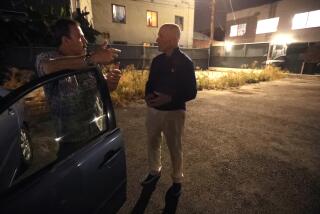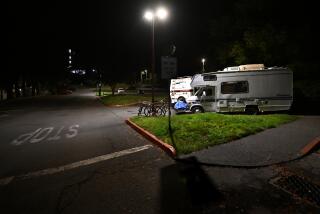Hotel for Homeless Women Shapes Up
- Share via
This afternoon, a ceremony will mark the official ground breaking for what is intended to be Orange County’s second--and largest--facility for housing single homeless women, the YWCA Hotel for Women in Santa Ana.
Politicians, longtime supporters of the housing project, YWCA staff and others will mingle at 4 p.m. during the open-to-the-public celebration, according to Mary Douglas, director of the South Orange County YWCA.
However, those who would like to occupy the hotel-to-be’s 40 beds will have to wait until next Jan. 1, Douglas said, when construction will be completed and more money will have been raised to furnish and operate the hotel.
At present, the only Orange County housing specifically for homeless women unaccompanied by mates or children is the 10-bed Martha House in Orange, which is run by the Episcopal Service Alliance and contains a staff-operated kitchen. The YWCA hotel, which will have 20 double-occupancy rooms but no kitchen, has been in the planning stages for two years and is being built on top of an existing one-story gymnasium on the YWCA property at 1411 N. Broadway. The gymnasium is also being renovated, as is the YWCA’s main building.
About $750,000 (enough money to finish most of the new construction which actually is already under way) has been pledged so far by individuals, foundations, United Way, corporations and the county, according to Marlee Parker, a member of the Program Foundation for Women, a year-old organization created to raise money for the hotel. This afternoon, Parker added, a surprise $850,000 construction loan will also be announced. (A total of $1 million is needed to build the hotel, Parker said, and because not all of the pledged funds have been received, the loan will serve to keep construction on schedule.)
Need Operating Expenses
YWCA staff will need an additional $110,000 for the hotel’s first-year operating expenses, Douglas said, and at least $17,000 of that budget will be provided directly by United Way. Further donations are being sought, and some of the hotel’s operating costs will be paid through fees charged to hotel residents, Douglas said.
Asking the women to pay for the rooms springs from a philosophical idea that is “the antithesis of the concept, ‘come in and we’ll take care of you,’ ” Douglas said. “If you don’t allow (people) to accept responsibility for themselves, I think (you) undermine their mental and physical health.”
Rates for the rooms have not yet been set, although Douglas estimates that $5 to $7 a night might be charged for each bed. Those fees will usually be paid through the women’s wages (if they have or can get jobs), through county-provided general relief housing allowances, through money from private foundations or through other sources. Considerable assistance will be given to those who need help in navigating “the maze of the welfare system,” Douglas added, and “no woman will be turned away if she doesn’t have access to (financial) assistance.”
Only women who are willing to work toward supporting themselves and acquiring independent, permanent housing will be eligible to live in the hotel, Douglas said. “The women will have to make a commitment, by literally signing a contract and setting up goals” toward independent living. “This isn’t the old missionary do-gooder concept,” she added. “We’re advocates for (building) a mission for women,” Douglas said, that will provide free housing for women who can’t become self-supporting. “But . . . some other entity will have to put (that) together. We can’t do it all.”
Most weekday mornings now, 25 to 30 homeless women visit the day center in the existing YWCA, Douglas said. There, the women can shower, participate in a cooking class and socialize. The program, for which there is no charge, usually runs from 8:30 to 11 a.m., Monday through Friday, Douglas said, and the program will continue even after the hotel is built.
No Beds Promised
Some of the women who come to the day center may eventually live in the hotel, according to Dianne Russell, a YWCA employee who directs the day center. However, no one has been promised a bed. In-depth intake interviews will determine who lives in the hotel when the facility is ready to open, she said.
“I think most (who come to the day center) are hoping they get to stay (in the hotel), but all of them know it is going to take a personal commitment. . . . I get the feeling that nobody wants to get their hopes up too much. A lot of the women have the potential to be successful, but they don’t realize it,” Russell said.
On a recent morning, about 15 homeless women were waiting when the YWCA’s kitchen door opened. Some of them hurried inside to shower, change and “go out hustling” for jobs, Russell said. Others lingered for a cup of coffee and a chance to chat.
Most of the women who attend the day center are between 42 and 55 years old, Russell said, but women in their early 20s also visit, as do older women like Connie (not her real name), a 70-year-old who began coming to the center in mid-January.
Connie might be eligible for temporary housing in the hotel, Russell said. And she might like to live there, Connie said, “if I can pay for it.”
At present, Connie said, her only income is her $449-a-month Social Security check. Since last August she and her 9-year-old poodle have been living in her beat-up sedan because she can’t afford to both pay rent and eat. Although she’s “always worked,” Connie said, she’s only found a few odd jobs since she lost a long-term housekeeping position last June, when her employer died.
Connie said she’s a widow with a grown-up daughter on whom she hasn’t wanted to impose. “I could (go to her), but I don’t want to because she’s got her family. As long as I can work, I’m going to work. And I’ve had real good health all my life,” Connie said. At present, she added, she also has the prospect of a housekeeping job taking care of two young children. If that works out, she might not need to apply to the hotel, she said.
Plan One-Month Residencies
Douglas said one-month residencies will be the norm at the hotel, which will have a manager on-site 24 hours a day. YWCA staff will also assist the residents in “life-planning” and setting work goals, Douglas said.
At Martha House, the Episcopal Service Alliance facility in Orange, a similar program is in place for a much smaller population of women, according to ESA executive director Dennis White. Single homeless women often stay at Martha House up to 2 1/2 months, White said, and during that time they are expected to help with house chores, to begin looking for work, to attend regular group meetings and, if possible, to begin paying 10% of their income toward the house’s expenses.
However, “the goal is to help (the women) move out on their own”--so many residents are encouraged to save rather than pay for their housing, White said. (Martha House’s $55,000 in annual operating costs are mostly paid through donations from Episcopal churches, corporations, individuals and the City of Orange, he added.)
“We are very anxious for the Y (hotel) to be opened,” said White, who estimates that there may be 8,000 to 12,000 homeless people in Orange County, 1,000 to 1,500 of them homeless single women.
(There is no official statistic available on Orange County’s homeless population. Douglas estimates that there may be 2,000 to 3,000 homeless single women in Orange County; Jean Forbath, director of Share Ourselves, a private Costa Mesa agency that helps the homeless, said she thinks that there are 4,000 homeless people in Orange County every night, and that 8% to 10% of those people are single women.) “Last month we had over 250 calls” from homeless single women looking for housing, White said.
“It’s very limited, really, where single homeless women can go,” said Jean Aldrich, who helped found the Orange County Coalition for the Homeless in 1982 and who is vice president of the Project for Women Foundation. The YWCA hotel’s prospective opening is “exciting, but it’s also frightening because (we) really have a tiger by the tail. . . . (The hotel will make) hardly a dent in what’s needed, but hopefully we can be a model for others,” Aldrich said.
In June, 1984 YWCA staff began searching for a hotel site when the City of Santa Ana said a program that allowed women to sleep in the YWCA parking lot was a “mission” and a violation of the city’s zoning laws. This afternoon, the hotel’s ground-breaking ceremony will feature speeches by Aldrich, Santa Ana Mayor Dan Griset, Project for Women Foundation executive vicepresident Harriet Harris and county Supervisor Thomas F. Riley, Douglas said.
But she hopes that other members of the hotel’s “rooting team” will also be present, she added. Some of those rooters have, in the last few years, mailed “crumpled dollar bills” to the YWCA to help cover hotel building costs. These small contributions frequently came from women who are barely meeting their own expenses, and they’re often accompanied by notes saying, “ ‘There but for the grace of God go I,’ ” Douglas said.
More to Read
Sign up for Essential California
The most important California stories and recommendations in your inbox every morning.
You may occasionally receive promotional content from the Los Angeles Times.













